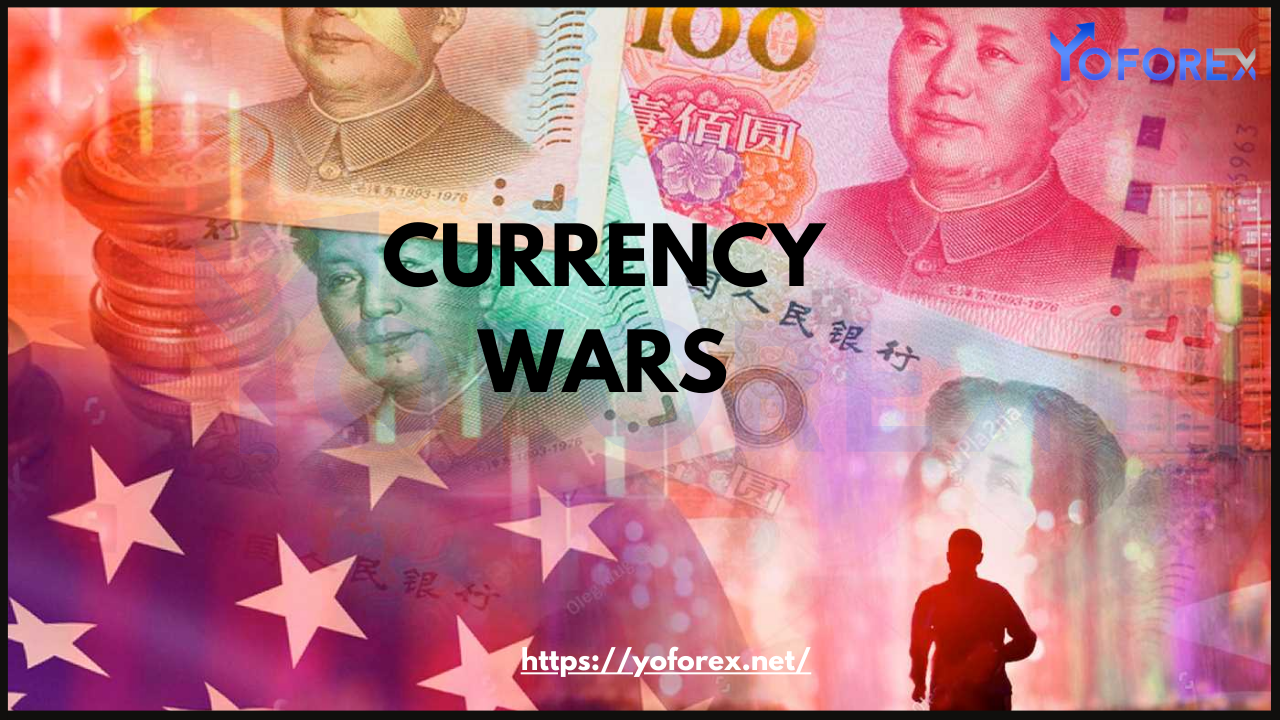Currency wars, also known as competitive devaluations, occur when countries deliberately devalue their currencies to gain economic advantages. These actions can significantly impact global forex markets, creating opportunities and challenges for traders. By understanding the mechanics and consequences of currency wars, forex traders can better navigate the complexities of international currency movements.
This blog explores the concept of currency wars, their causes, their effects on global forex markets, and strategies traders can employ to adapt to these volatile conditions.
What Are Currency Wars?
A currency war occurs when countries engage in deliberate actions to weaken their currencies. This is typically done to achieve specific economic objectives, such as boosting exports, reducing debt burdens, or stimulating economic growth.

Key Characteristics:
- Deliberate Devaluation:
- Governments or central banks use monetary policy tools to lower the value of their currency.
- Economic Competition:
- Countries aim to gain a competitive advantage over trading partners by making their goods and services cheaper.
- Global Ripple Effects:
- Actions by one country can provoke retaliatory measures from others, leading to instability in forex markets.
Causes of Currency Wars
1. Export Competitiveness
- A weaker currency makes a country’s exports cheaper and more attractive in international markets.
- Example: China has been accused of keeping the Yuan undervalued to boost its export-driven economy.
2. Economic Stimulus
- Devaluing a currency can stimulate economic growth by encouraging domestic production and consumption.
- Example: Japan’s aggressive monetary easing under Abenomics aimed to weaken the Yen to revive its economy.
3. Debt Management
- A weaker currency reduces the real value of sovereign debt, making it easier for governments to manage repayments.
4. Retaliatory Measures
- Countries may devalue their currencies in response to similar actions by others, escalating a cycle of competitive devaluations.
Effects of Currency Wars on Global Forex Markets
Currency wars can have profound and far-reaching effects on global forex markets, influencing currency values, trade balances, and investor behavior.
1. Increased Volatility
- Deliberate devaluations and retaliatory measures create uncertainty, leading to sharp and unpredictable currency movements.
- Example: During the 2010-2013 currency war, significant fluctuations were observed in USD, JPY, and EUR pairs.
2. Trade Imbalances
- Currency devaluations disrupt global trade balances, favoring countries with weaker currencies while disadvantaging stronger ones.
- Example: The US-China trade tensions highlighted the impact of perceived currency manipulation on trade deficits.
3. Impact on Inflation
- A weaker currency increases the cost of imports, potentially leading to higher inflation.
- Example: Emerging markets often face inflationary pressures when their currencies depreciate significantly.
4. Central Bank Interventions
- Central banks frequently intervene in forex markets to stabilize their currencies or counteract competitive devaluations.
- Example: The Swiss National Bank intervened in 2011 to cap the Franc’s appreciation against the Euro.
5. Investor Sentiment
- Currency wars erode confidence in financial markets, driving investors to seek safe-haven assets like gold or the US Dollar.
Historical Examples of Currency Wars
1. The Great Depression (1930s)
- Countries abandoned the gold standard and devalued their currencies to boost exports and counter deflation.
- Impact: Increased trade barriers and economic isolation, exacerbate the global economic crisis.
2. Plaza Accord (1985)
- Agreement among G5 nations to weaken the US Dollar to reduce trade imbalances.
- Impact: Stabilized forex markets but highlighted the need for international coordination.
3. Post-2008 Financial Crisis
- Central banks implemented quantitative easing and interest rate cuts, leading to accusations of currency manipulation.
- Impact: Increased volatility in major currency pairs and a renewed focus on currency policies.
How Traders Can Adapt to Currency Wars
Currency wars create both risks and opportunities for forex traders. Adopting the right strategies and tools can help navigate these challenging conditions.
1. Monitor Central Bank Policies
- Stay updated on monetary policy decisions, interest rate changes, and quantitative easing programs.
- Tools: Economic calendars, central bank statements, and market news feeds.
2. Trade Safe-Haven Currencies
- Safe-haven currencies like USD, CHF, and JPY often appreciate during currency wars as investors seek stability.
- Strategy: Buy safe-haven currencies during periods of heightened uncertainty.
3. Focus on Carry Trades
- Exploit interest rate differentials between currencies by entering carry trades.
- Example: Borrow in a low-interest currency like JPY and invest in a high-yield currency like AUD.
4. Use Technical Analysis
- Identify key support and resistance levels, trendlines, and chart patterns to predict currency movements.
- Indicators: Moving averages, MACD, and RSI can provide additional insights.
5. Diversify Your Portfolio
- Spread investments across multiple currencies and asset classes to reduce risk exposure.
6. Hedge Against Risk
- Use hedging strategies, such as options or futures, to protect against adverse currency movements.
Risks and Challenges for Traders
- Unpredictable Policy Changes:
- Sudden shifts in monetary policy or retaliatory measures can lead to unexpected market movements.
- False Breakouts:
- Currency wars increase the likelihood of false breakouts, and misleading traders.
- High Transaction Costs:
- Increased volatility can widen spreads, raising trading costs.
- Market Sentiment Shifts:
- Rapid changes in sentiment can lead to whipsaw movements, challenging even experienced traders.
Future Outlook of Currency Wars
The likelihood of future currency wars depends on geopolitical dynamics, economic conditions, and technological advancements.
1. Role of Digital Currencies
- Central bank digital currencies (CBDCs) may offer new tools for managing currency values and mitigating competitive devaluations.
2. Increased Cooperation
- International agreements, like the Plaza Accord, could reduce the frequency and intensity of currency wars.
3. Global Economic Shifts
- As emerging markets gain prominence, currency wars may shift focus from developed nations to regions like Asia and Africa.
Conclusion
Currency wars significantly impact global forex markets, influencing currency values, trade balances, and investor behavior. While they create challenges, they also offer opportunities for traders who understand the mechanics and adopt disciplined strategies. By staying informed, diversifying portfolios, and managing risks effectively, forex traders can navigate the complexities of currency wars and capitalize on market volatility.

